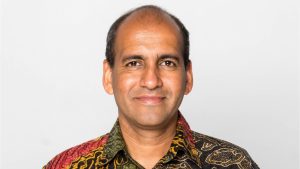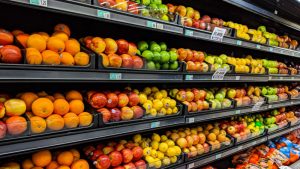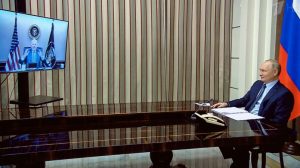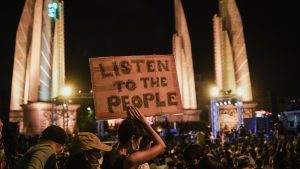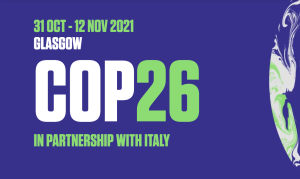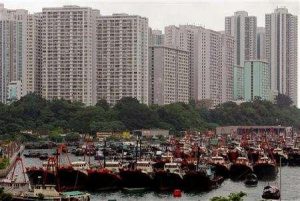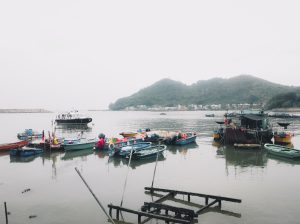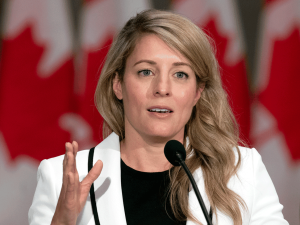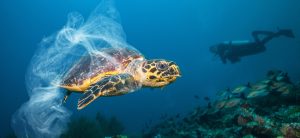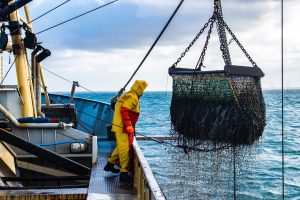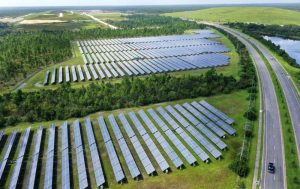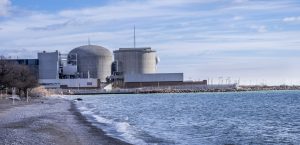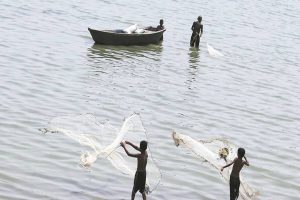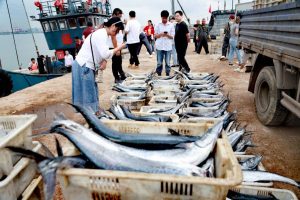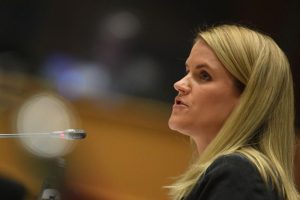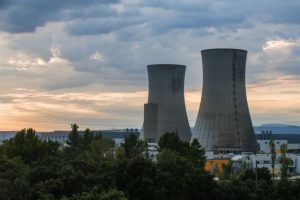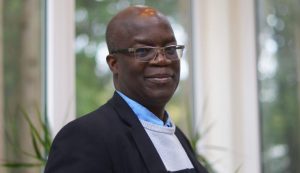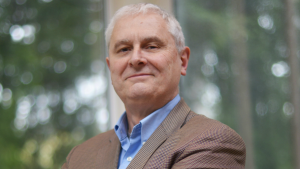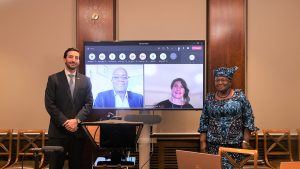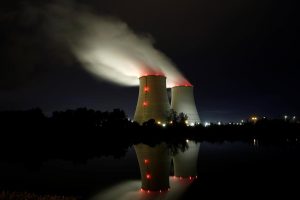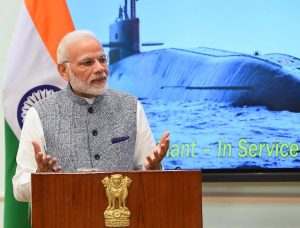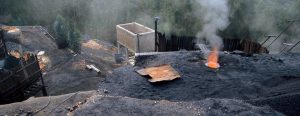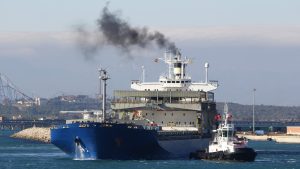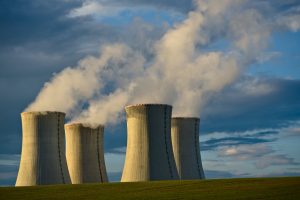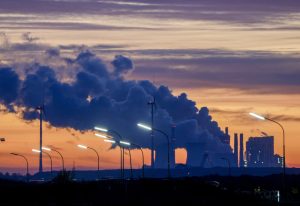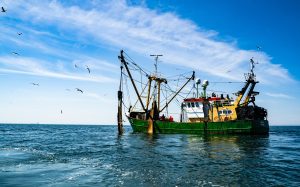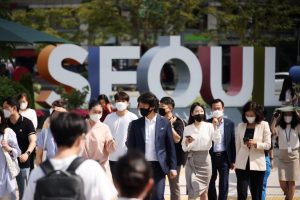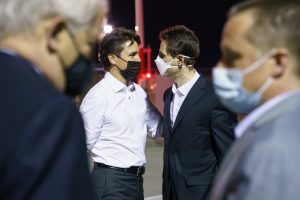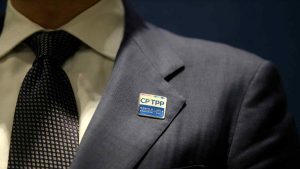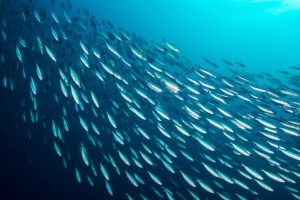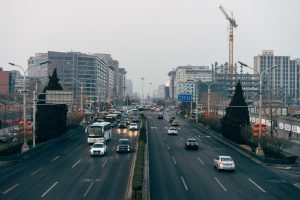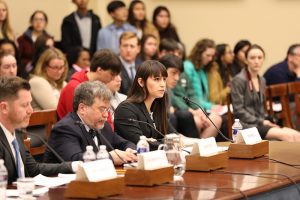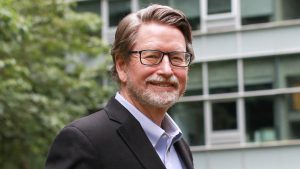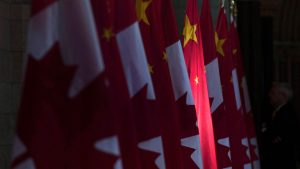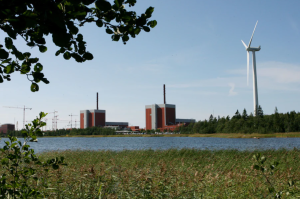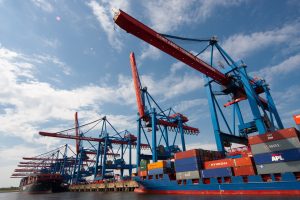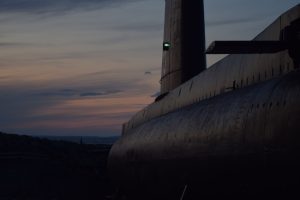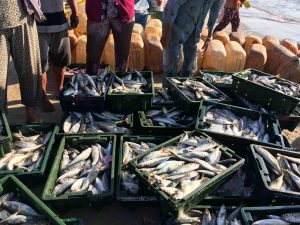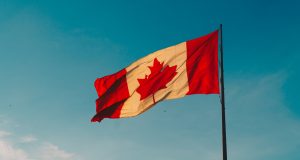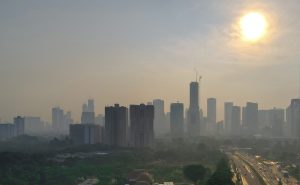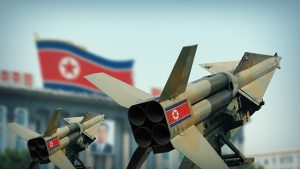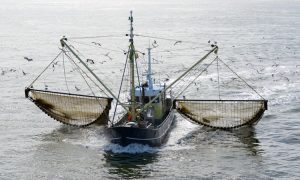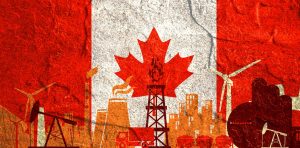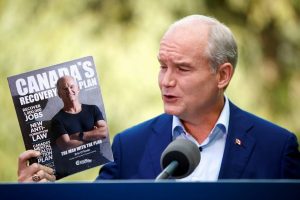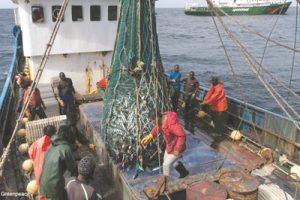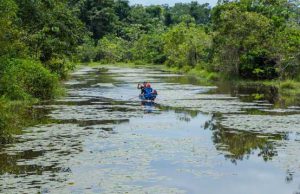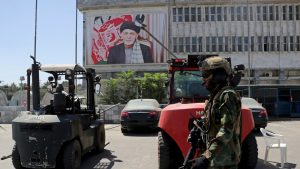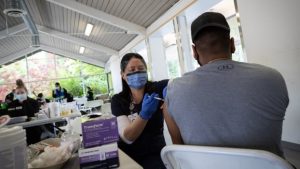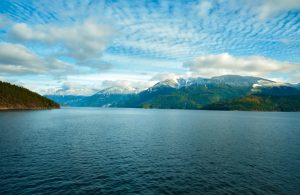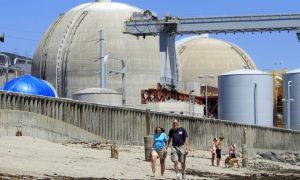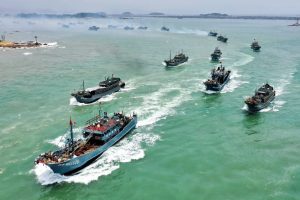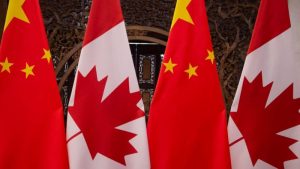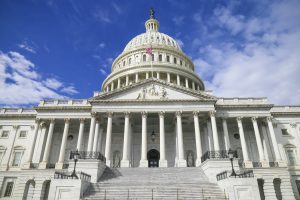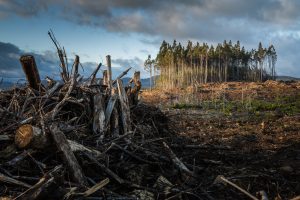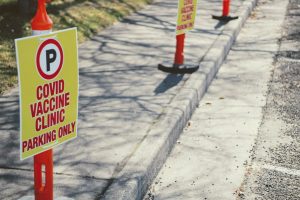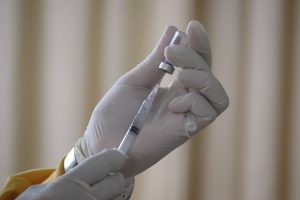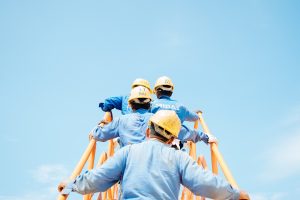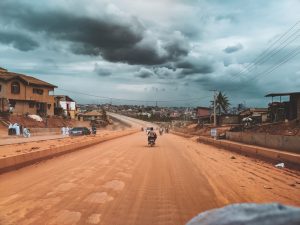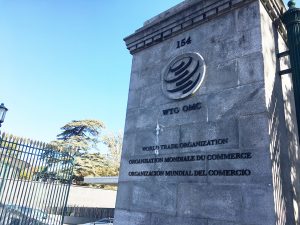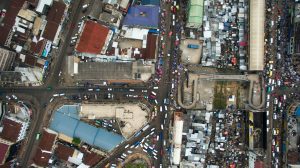Shunned after Fukushima, Nuclear Industry Hopes Smaller Reactors Can Play Role in Energy Transition
While proponents claim small nuclear reactors are safe, many, including Professor Ramana, understand that “nuclear fission is inherently dangerous and it’s difficult to judge the safety of reactors that haven’t been licensed or produced yet.”
B.C. Food Prices in 2022 Forecast to be Above Already-High National Average
With the release of a news report detailing the 2022 national forecast for food prices, Professor Matias Margulis (SPPGA; LFS) examines why B.C. prices are estimated to be above the already high national average.
Ukraine Tensions Remain High After Putin-Biden Talk as Neither Side Likely to Give Ground
Professor M.V. Ramana warns about the rising tension between the USA and Russia over Russia’s alleged plans to invade Ukraine.
History Explains Why Global Content Moderation Cannot Work
Professor Heidi Tworek (SPPGA; History) analyzes the history of speech moderation and shares why social media platforms generating standards for acceptable speech is an all but impossible challenge.
Don’t Ignore Democracy’s Flaws
Approaching Biden’s Summit for Democracy and the Ninth Summit of the Americas, Professor Max Cameron (Former SPPGA Acting Director; Political Science) proposes three key steps to strengthen democracy.
You’ll See More Carbon Labels in the Grocery Store Next Year. Here’s What They Mean.
Professor Navin Ramankutty (SPPGA; IRES) discusses the best ways to approach climate solutions, and whether attaching carbon labels to products at the grocery store is an effective method.
A Nuclear-Weapons-Free-Zone in the Middle East— & the Elephant in the Room
After nations gathered to discuss establishing a nuclear-weapon-free zones in the Middle East, Professor Ramana reasons that such a zone will be a major challenge largely due to policies around Israel’s nuclear weapons program.
SPPGA Engages with COP26
Several members of the SPPGA community and faculty speak on their participation or share their expertise on the 26th UN Climate Change Conference of the Parties (COP26).
All About Money with UBC’s Rashid Sumaila – Part 2
In part two of this interview with Hong Kong International Business Channel, Professor Rashid Sumaila (SPPGA; IOF) discusses Hong Kong’s role in the fishing industry as a ‘disproportionately’ large consumer.
Modular Nuclear Reactors a ‘Long Shot’ Worth Studying, Says Yukon Gov’t
Professor M.V. Ramana argues that small modular reactors (SMRs) are not a practical and realistic approach to reducing emissions for Yukon and the rest of Canada.
All About Money with UBC’s Rashid Sumaila
In a discussion with Hong Kong International Business Channel, Professor Rashid Sumaila (SPPGA; IOF) examines some of the main drivers of depleting commercial fish populations, including fish farms – and how they’re in fact contributing to overfishing.
Eliminating Harmful Fishing Subsidies: Lessons from Regional Trade Agreements
Professor Rashid Sumaila (SPPGA; IOF) breaks down how eliminating harmful fishing subsidies could save the planet’s oceans and ocean economy.
The ‘Penny Has Dropped’: Liberal Government Throne Speech Signals New Direction on China, Analysts Say
Professor Paul Evans analyzes the Liberal government’s usage of the term “Indo-Pacific” in their crown speech, and what it indicates about the future direction of Canada-China relations.
Instead of Shopping This Black Friday, Consider Curbing Your Consumption
As Black Friday kicks off the holiday shopping season, Professor Rashid Sumaila (SPPGA; UBC Oceans) urges consumers to make the connection between what they buy and what eventually ends up harming our ecosystems—and our health.
Report Shares Good and Bad News for Canada’s Fisheries
Professor Rashid Sumaila (SPPGA; IOF) discusses the need for Fisheries and Oceans Canada to implement new fishing regulations to conserve and rebuild depleting fish stocks with Global News Canada.
Nuclear Power and America’s Clean Energy Future
With US government funding lined up to put shovels in the ground for new nuclear test plants, SPPGA Director and Professor Allison Macfarlane discusses uncertainties surrounding the promise of nuclear power.
Should Nuclear Have a Place in Canada’s Climate Strategy?
As Canada commits to new climate targets following COP26, Professor M. V. Ramana argues that Canada should focus on renewables, rather than nuclear energy sources as the answer for both climate and post-COVID economic woes.
Fishery Subsidy: India to Seek Fairer Deal at WTO
As India is pushing for a fair fishery subsidy deal at the WTO, this article shares a study led by Professor Rashid Sumaila (SPPGA; UBC Oceans) showing that the subsidy in India is billions of dollars lower than other countries.
Plenty of Fish in the Ocean? Not so Around China, Says Study Warning of Seafood Collapse
Fish stocks in the South China Sea are at risk of collapse if action is not taken in the next 10 years to reduce overfishing and the effects of climate change. Professor Rashid Sumaila (SPPGA; UBC Oceans) states that it is important to enforce sustainable fishing practices so that fisheries can continue to feed and nourish us.
Leaked Facebook Document Shows How Often the Company Restores Posts — And How the Rates Change Depending on Where You Live
With internal Facebook documents being leaked, Professor Heidi Tworek (SPPGA; History) examines why the appeal rate for post removal varies widely depending on where you live.
Is Nuclear Power the Way Forward to Combat the Climate Crisis?
As the United Nations Climate Change Conference wraps up, SPPGA Director and Professor Allison Macfarlane states that there is a definite need to move away from fossil fuels, and that nuclear power could potentially be the way forward.
For Local Fishers to Compete, African Leaders Must Urge WTO Members to End Harmful Subsidies
Professor Rashid Sumaila (SPPGA & UBC Oceans) co-authors an article looking at harmful fisheries subsidies and threats to Africa’s fish stocks.
The 2022 Budget Reading Is Coming Up: Three New Things I Want to See in the Budget
MPPGA alumnus Solomon Atta points out three things he would like to see from Ghana’s upcoming Budget Statement and Economic Policy reading.
Xi Jinping Is in a Good Position to Break Norms and Continue to Lead China
Professor Timothy Cheek (SPPGA; History) speaks on China’s Communist Party passing a historic resolution that will allow leader Xi Jinping to lead for an unprecedented third term.
Mongolia and Kyrgyzstan Struggle with the Curse of Mineral Wealth
Professor Julian Dierkes comments on the daunting challenges facing Mongolia and Kyrgyzstan’s mining industry. (Subscription)
Scientists Urging Members to Reach MC12 Fishing Subsidies Agreement Present Letter to DG Okonjo-Iweala
As a lead co-author, Professor Rashid Sumaila (SPPGA; UBC Oceans) presented a letter calling for the WTO to curb harmful fisheries subsidies to Director-General Okonjo-Iweala on behalf of nearly 400 ocean experts.
Going Nuclear on Climate Change
Director Allison Macfarlane enters the debate over the role of nuclear power in achieving net zero carbon emissions (Subscription).
AMS Turns Focus to Reducing Employee Carbon Emissions as Part of Net-zero Emissions Plan
Professor Milind Kandlikar (SPPGA; IRES) weighs in on the AMS plan to hit net-zero emissions and on the long-term impacts of offsetting carbon emissions.
What’s Known—and Not Known—About India’s Nuclear Weapons Budget
With India’s lack of transparency around nuclear weapon expenditures, Professor MV Ramana states that even government bureaucracies do not seem to have access to expenses relating to weapons facilities.
Joint Statement by UN human rights experts – Accelerate the end of the coal era to protect human rights
Professor David Boyd (SPPGA; IRES) makes a statement about the necessity to end the coal era in order to protect a range of human rights, including the rights to a safe, clean, healthy and sustainable environment, to life, to health, and the rights of the child and the rights of Indigenous peoples.
Tax Air Travel and Sea Shipping to Help Climate-Vulnerable Nations, UN Expert Tells COP-26 Leaders
In a message directed to world leaders gathering for COP-26, Professor David Boyd (SPPGA; IRES) states that new taxes on air travel and maritime shipping could raise the billions of dollars needed to help the countries suffering most from climate change.
Nuclear Industry Has High Hopes for Net-Zero Future
Professor M. V. Ramana, Professor Nadja Kunz (SPPGA, Mining Engineering), and Sarah Froese (MPPGA Alum) were quoted about the future of nuclear power.
Can Nuclear Power Stay Relevant in a World Filled with Renewables?
Professor M. V. Ramana speaks with POWER Magazine as a contributor to Mycle Schneider Consulting’s World Nuclear Industry Status Report 2021 about the structural challenges of nuclear power.
COP26: Strong Carbon-trading Rules Could Help the World Avoid Dangerous Levels of Global Warming
Despite recent government decisions to shutter coal-fired power plants in wealthier nations, coal remains the source of almost 40% of the world’s electricity. MPPGA alumna Citlali Cruz Cruz discusses a way that COP26 could lay the groundwork for an international emissions-trading system that could bring an end to the production of coal-fired electricity.
Experts Are Trying to Convince WTO to Ban Harmful Fisheries
Professor Rashid Sumaila (SPPGA; UBC Oceans) appeared on GB News to discuss why it is necessary for the WTO to eliminates subsidies for fuel, distant-water and destructive fishing fleets, and illegal and unregulated vessels.
Experts Are Trying to Convince WTO to Ban Harmful Fisheries
Professor Rashid Sumaila (SPPGA; UBC Oceans) speaks with GB News as the lead author of an open letter written by nearly 300 experts that urges the WTO to ban fisheries subsidies.
South Korea’s Deepening Social Fractures Amid COVID-19 Success
While South Korea was well prepared and acted rapidly at the beginning of the COVID-19 pandemic resulting in a comparatively low death rate, Professor Yves Tiberghien (SPPGA Faculty Associate; Political Science) discusses how the pandemic has exposed deep social fragilities and worsened inequalities.
The ‘Glaring Gap’ in B.C.’s New Climate Plan
Professor George Hoberg states that the B.C. government’s new CleanBC plan has sent “an important signal” to the oil and gas industry, despite the lack of clarity around the industry’s emissions reductions.
B.C. Lifting COVID-19 Capacity Restrictions, but Not Everyone Ready to Resume Usual Gatherings
With British Columbia set to lift capacity restrictions on gatherings across much of the province, Professor Heidi Tworek (SPPGA; History) argues that not everyone will be ready to resume regular gatherings and that the lack of regular contact with people after nearly two years will have affected some people’s mental health.
Under New Emissions Plan, B.C. Accelerates Phase-Out of Gas-Powered Cars
The B.C. government has released the new CleanBC Roadmap to 2030, outlining B.C.’s climate plan to reduce greenhouse gas emissions. SPPGA Professor George Hoberg commends the ambitions but criticizes the lack of clarity surrounding capping emissions on oil and gas utilities.
Huawei CFO Meng Wanzhou & 2 Michaels Media Mentions
Prime Minister Justin Trudeau announced on September 24, 2021 that Canada’s Michael Korvig and Michael Spavor, dubbed the 2 Michaels, were returning from detention in China shortly after Huawei CFO Meng Wanzhou was released from house arrest in Canada.
CPTPP Members Must Be Wary of China’s Attempt to Join Trade Pact
Since China’s announcement last month about its application to join the Comprehensive and Progressive Agreement for Trans-Pacific Partnership (CPTPP), Singapore and Malaysia have indicated their approval. In her authored article, Professor Kristen Hopewell exhorts the CPTPP members to be cautious of China’s attempt of entry because of their history of economic coercion and disregard for global trade rules.
Doubling of Global Demand for Aquatic Foods Calls for a ‘Blue Food Revolution’ to Tackle Climate Change and Malnutrition
In this podcast episode with Kelly Cutrara, Professor Rashid Sumaila (SPPGA; UBC Oceans) discusses how the increasing global demand for aquatic foods calls for a ‘blue food revolution’ to help combat climate change and malnutrition.
Analysts Say China on Track to Meet Carbon Targets Despite Challenges
In anticipation for the COP26 United Nations Climate Change Conference, the world is following China closely as they are the largest global polluter. Professor Yves Tiberghien (SPPGA Faculty Associate; Political Science) discusses China’s accomplishments in sustainability and states that they are on track to meet carbon targets despite current challenges.
Half of Canadian Parents Plan to Get Their Young Kids Vaccinated Against COVID-19
A new survey shows that half of Canadian parents intend to vaccinate their children ages 5 to 11 as soon as the vaccine is available to the age group. Professor Heidi Tworek (SPPGA; History) urges for more information about COVID vaccinations in children to be provided to parents.
Ramana, Makhijani: Look Before You Leap on Nuclear
Professor Ramana explains why the proposal to build a Natrium nuclear reactor in Wyoming is unlikely to be commercially viable, taking into account the long history of failed sodium cooled reactor projects around the world (Paywall).
‘I Hope You Die’: How the COVID Pandemic Unleashed Attacks on Scientists
Dozens of scientists say they have received death threats and other forms of harassment after media interviews on Covid-19. Professor Heidi Tworek (SPPGA; History) comments on this phenomenon.
Canada: British Submarines Fiasco Has Left Its Mark (French)
SPPGA Professor Paul Evans is quoted on a story about four submersibles from the U.K. and Ottawa’s choices to strengthen its fleet in the Pacific.
Will Parents Line Up to Get Their Kids Vaccinated?
With the age of eligibility to register for COVID-19 vaccines lowering, Professor Heidi Tworek (SPPGA; History) speaks to CBC Early Edition about how officials can persuade hesitant parents to get their kids vaccinated.
Canada Urged to Join Allies in Tougher China Stance After Kovrig, Spavor Release
Following Canada’s long fight with China over the imprisonment of the Michael Spavor and Michael Kovrig, Professor Paul Evans argues that Canada’s recent usage of the label “Indo-Pacific” rather than “Asia-Pacific” signifies Canada taking a tougher stance towards future relations with China.
Pay Close Attention to Russia’s Small Neighbor on Energy
Achieving carbon neutrality is a matter that’s the source of headache for many politicians. But if there’s one country with clear and ambitious energy targets, it’s Finland. Former Postdoctoral Fellow Vincent Ialenti comments on Finland’s “mankala model”.
Canada Must Oppose China’s Entry to Trans-Pacific Trade Pact
China officially applied to be a part of the Comprehensive and Progressive Agreement for Trans-Pacific Partnership (CPTPP) in September 2021 and is awaiting the members’ approval. In her authored article, Professor Kristen Hopewell advises Canada to deny China’s entry due to their history of global trade rules violations under President Xi Jinping.
On the Politics of Waste, Race, and Disposability
Professor Ramana, Professor Arefin (Geography), and Professor Troeung (English) discuss the overlooked topic of waste, in a fascinating conversation about the ethics of waste surveillance and how waste is a product of a broader system of power, politics and inequality.
A US-UK Submarine Deal Triggers Nuclear Fears Down Under
The US, UK, and Australia agreed on a tripartite deal (AUKUS) to supply a nuclear-powered submarine to Australia. Professor M. V. Ramana raises concerns about the partnership as it will increase tensions with China and can escalate the ongoing arms race.
Renewed WTO Talks on Subsidies Zero in on Overcapacity, Overfishing
The World Trade Organization is again negotiating an agreement to end harmful fishery subsidies after more than two decades on the matter. Professor Rashid Sumaila (SPPGA; UBC Oceans) stresses that it is crucial for negotiators to continue working on the issues holding up the agreement.
AUKUS May Trigger Nuclear Arms Race in Indo-Pacific, France to Stay in NATO
Professor Ramana states that the nuclear issue brought forward by new AUKUS defense deal is disturbing at two levels, as it further escalates tensions with China, and the decision to share military technology blows a hole in the nuclear non-proliferation regime.
Canada Federal Election Media Mentions
As the country ramps up for the Canadian federal election taking place on September 20, 2021, our SPPGA faculty are observing closely as political fervor sweeps the nation.
Indonesian Court Rules President Negligent over Pollution
The Central Jakarta District Court orders President Widodo and six other officials to strengthen air quality standards after finding them guilty of neglecting citizens’ right to clean air. Professor David Boyd (SPPGA & UBC IRES) emphasizes the constitutional and legislative duty of the Indonesian government to protect its people from the dire consequences of air pollution.
N. Korea’s Cruise Missile Test Aimed to Draw US Attention, Resumption of Talks Unlikely
Following North Korea conducting a cruise missile test aiming to draw U.S attention, prospects of future denuclearization talks remain dim. Professor Ramana states that he doesn’t believe the test will result in significant changes in U.S policy.
Trudeaus Agreed to Father’s Book Being Published by Chinese Communist-Run Company in 2005
Experts are discussing the motives behind a Chinese Communist-run company publishing book co-authored by Pierre Trudeau. Professor Paul Evans argues that it is doubtful the offer to translate and publish the book had anything to do with attempting to influence the Trudeau sons.
Fish Consumption to Double by 2050, According to New Report
A Blue Food Assessment report estimates global consumption of fish and shellfish will almost double by 2050. Professor Rashid Sumaila (SPPGA & UBC Oceans) advises blue food exporters to carefully evaluate the trade-off between export revenues and domestic nutrition.
Nuclear Power: Why Molten Salt Reactors Are Problematic and Canada Investing in Them Is a Waste
One of the beneficiaries leading-up to the federal election has been the nuclear energy industry, specifically molten salt reactors. Professor Ramana states that molten salt reactors are problematic and that Canada investing in them is a waste.
China Weighs In on Canada’s Election After Conservatives Promise to ‘Stand Up’ to Beijing
Despite the Conservative Party having China in its election cross hairs after their promise to “stand up to Beijing,” Professor Yves Tiberghien (SPPGA Faculty Associate; Political Science) says that Canada’s stance on China remains contingent on developments in the US-China relationship.
Fight ‘Galamsey’ at High Sea!
Dr. Rashid Sumaila, (SPPGA; UBC Oceans) discussed the cost of illicit trade in West Africa marine resources. He says “resources to tackle illegal and unreported fishing, especially those that fuel illicit trade, need to be pulled at both at regional and continental levels.”
[Federal Election] Analysis of Political Parties’ China Policy (BC)
Professor Paul Evans speaks in an interview regarding the Canadian election and the country’s China policy. (Video in Chinese).
A Regional Agreement for Healthy Eco-Systems in Latin America & the Caribbean
Latin America and Caribbean continues to face dire ecological challenges. Claudia Ituarte-Lima argues that cooperation between vibrant grass-roots, civil society and government will be vital in championing the global recognition of the right to a safe, clean, healthy and sustainable environment.
Canada, Allies Watchful of How China Will Fill Western Void in Afghanistan
With the withdrawal of the United States and its allies from Afghanistan, China is stepping into the void to exert influence on the troubled country. Professor Paul Evans states that avoiding spillover of terrorist groups into China is the number one priority.
Thousands of People in BC Remain Unvaccinated. How Can Health Officials Convince Them to get Immunized?
CBC News spoke to Dr. Heidi Tworek (SPPGA; History) about the challenge of improving COVID-19 immunization efforts as thousands of people in B.C. remain unvaccinated.
Why Female Political Candidates in Canada are Receiving More Toxicity on Twitter
Professor Heidi Tworek (History; SPPGA) comments on why female political candidates in Canada are receiving more toxicity on social media, and how to deal with it.
Are Vietnamese Fishers Poachers? The Reality Is Far More Complex Than That.
For Vietnamese fishers, their fate is now largely charted not just by their country’s fishing regulations but also by that of their neighbors in the South China Sea. Rappler cited a study co-authored by Professor Rashid Sumaila (SPPGA & UBC Oceans), which found that destructive fishing practices have decimated the East Sea’s fish stocks since the 1950s.
Asia’s Wealthiest Man Is Going Green but Still Gets Rich off Oil
SPPGA Professor Ramana says it would be hard for Reliance Industries, which owns the world’s largest oil refining complex, to dissociate from the emissions-heavy fossil fuel business despite their efforts to build more environmentally friendly products.
Is There a Nuclear Option for Stopping Climate Change?
A rapidly warming climate has people questioning whether nuclear power is a viable option for decarbonisation. Director Allison Macfarlane warns that the construction time for nuclear plants is much longer compared to renewable projects and America “can’t afford to wait that long” (Subscription).
Canada-North Korea Pursuing Academic Exchanges via Video Conference
Prof Kyung-Ae Park was interviewed on the topic of constructive engagement with North Korea during the COVID-19 period, discussing KPP’s recent initiatives of knowledge sharing via video conference with Pyongyang (in Korean)
South China Sea, Xinjiang Muddy Water of Fishing Subsidies Debate as WTO Faces ‘Crucial Test’
The World Trade Organization hopes to conclude negotiations over fishing subsidies this year after a twenty-year impasse. SPPGA Professor Kristen Hopewell was quoted on this article on environmentally damaging fisheries subsidies worth $35 billion, with China handing out the most (Subscription).
Disputa China-Canadá: el juego político detrás de la condena a muerte de Robert Schellenberg
Professor Paul Evans and MPPGA Alumni Darren Touch were quoted on China’s “hostage diplomacy” following Canadian businessman Michael Spavor’s sentencing for alleged espionage. (Article in Spanish).
Transparency in Environmental and Resource Governance: Theories of Change for the EITI
Professor Philippe Le Billon (SPPGA; Geography) co-authors article discussing how transparency is now a core principle in environmental and resource governance and identifies three “Theories of Change” for governance-by-disclosure and applies them to the Extractive Industries Transparency Initiative.
We’ve Been Here Before: Wyoming Nuclear Project Echoes of Past
After state officials unveiled Wyoming’s Natrium nuclear project, industry critics are doubtful plans will follow through. Director Allison Macfarlane warns that “we can’t pin our hopes on [nuclear] as the thing that’s going to get us out of the next 20 [crucial] years.”
Another 30 Years to Go – the Final Storage of High-level Radioactive Waste
Read the latest interview with SPPGA Director Allison Macfarlane, where she discusses the worldwide search for a nuclear repository, the factors that determine a successful site search and the current United States’ stalemate on this issue.
Targeting COVID-19 Vaccine Hesitancy
Professor Heidi Tworek (SPPGA; History) breaks down how we can have healthy conversations with our loved ones about getting vaccinated and what could be done to address the factors behind vaccine hesitancy.
Why Is the Vaccination Rate in the Interior and Northern Health Regions Relatively Low?
“To combat disinformation, we avoid stigmatizing people who haven’t gotten the vaccine yet.” Professor Heidi Tworek (SPPGA; History) places emphasis on taking an empathetic and curious approach in communicating with unvaccinated individuals.
Atieh Yekta Awarded WorkSafeBC Research Training Award
Congratulations to our MPPGA program alumna Atieh Yekta! As a recipient of this award, Atieh is supported to foster the development of occupational health and safety research expertise in B.C.
From Local to Global – Advocating for Human Rights in Nigeria
Listen to the latest episode of ‘Audio Alumni’ featuring MPPGA alumni Eseohe Ojo, where she talks about her work in advocating for human rights, as well as the importance of access to information in Covid-19 and Black Lives Matter.
EU the New Kingpin in Global Trade Order
With the U.S. cutting off the WTO’s “entire mechanism for enforcing global trade rules and resolving disputes”, SPPGA Professor Kristen Hopewell remarks that the E.U. has stepped in to resolve this crisis.
